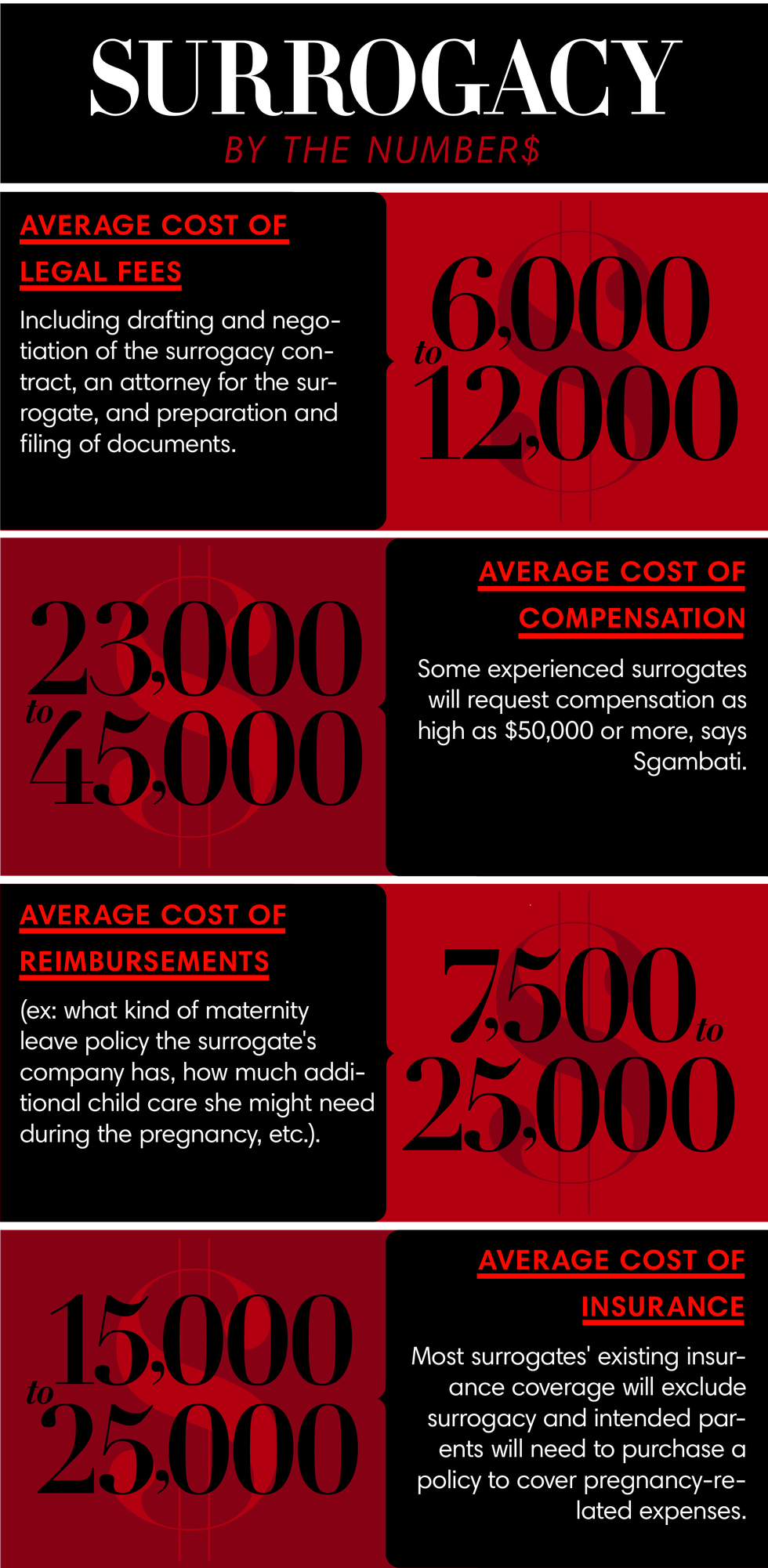It may be said that three’s a crowd, but for people hoping to make a baby, it’s the magic number. When options are limited or a pregnancy deemed impossible, many turn to surrogacy to help grow a family. But it's not always the simplest of processes—with legal implications and financial intricacies before the baby is even conceived. As none other than Kim Kardashian West gears up to welcome her third child via surrogate, we decided to explore the ins and outs of surrogacy today.
The Basics
There are two types of surrogacy—traditional and gestational. In traditional surrogacy, the surrogate is impregnated with the intended father’s sperm, so the resulting baby is her own genetic child. After the birth, the surrogate will relinquish the child to the intended parents. Traditional surrogacy is much more infrequently done because it is more legally complex than gestational surrogacy and often subject to different laws and prohibitions (i.e. many states with statutes that permit gestational surrogacy explicitly prohibit traditional surrogacy), says Maria F. Costantini-Ferrando, MD, PhD, FACOG, a fertility specialist at Reproductive Medicine Associates of New Jersey.
A gestational carrier is a woman bearing a genetically unrelated child for another person or couple. The egg and sperm either come from the intended parents or other donors, and the embryo transferred to the surrogate via In-Vitro Fertilization (IVF). Between 1999 and 2013, 18,400 infants were born via gestational surrogate. More and more people are turning to gestational carriers: according to the Centers for Disease Control and Prevention, the number increased from 727 (1.0%) in 1999 to 3,432 (2.5%) in 2013.
Why Use A Surrogate?
There are a few reasons you might turn to a surrogate. For some women, being pregnant poses too great of a health risk—as is the case with Kardashian West, whose difficult pregnancies and deliveries would make carrying a third child dangerous. Surrogacy is often an option for a woman with a history of breast cancer where there is a risk of recurrence, or if there is another serious medical condition where carrying a pregnancy may place a mother at risk for severe illness or even death, says Costantini-Ferrando. It's also an option for a woman with no uterus—either since birth or due to surgery—or that her uterus is for whatever reason unable to either carry a pregnancy or bring it successfully to term. Finally, surrogacy is also used when a same gender male couple or a single man decides to have a child that is genetically related, says Margaret E. Swain, a Maryland-based attorney and director of the American Academy of Assisted Reproductive Attorneys (AARTA).
Why Become A Surrogate?
Women who decide to become a surrogate do so for a variety of reasons, notes Stephanie Sgambati, the director of Pearl Surrogacy LLC, an agency in New York City. “There are a few things I do hear all the time, and the first ones is surrogates feel drawn or called to surrogacy and they think about it for a while–often years–before deciding when the right time is for them," she says. "Surrogates also frequently know someone who has struggled with infertility and they feel compassion and empathy. They often talk about their desire to be a surrogate in terms of their own children, how they cannot imagine their lives without them and how they want to give that joy to someone else. They see surrogacy as a way for them to give back,” says Sgambati. Another commonality is that most surrogates describe their pregnancies as easy and say they thoroughly enjoyed being pregnant.
The Lengthy Legalese
Before egg meets sperm meets surrogate's uterus, a lot of legal paperwork needs to be taken care of. Laws vary widely state-by-state, notes Swain. But ideally, the birth will take place in a state that allows for the enforcement of surrogacy contracts. “The majority of states actually have no laws addressing surrogacy, so without prohibitions and restrictions, those states are considered ‘friendly,’” says Swain. Besides that, states that will permit the issuance of a pre-birth parentage order to be effective the moment the child is born are the most desirable, because that means there’s no need for later adoption processes. The contract between a couple and a surrogate will be detailed and will lay everything out—from exactly who can be in the delivery room, to any additional payments if the surrogate carries a twin pregnancy or if she has a C-section, says Sgambati.
What Does it Cost?
It’s not an inexpensive process by any estimation. In general, a “successful surrogacy journey” (meaning one that ends with a delivery) will cost $75,000 to over $100,000, plus costs associated with making embryos, says Sgambati. Within that overall cost, the big categories are: agency fee, legal fees, compensation and reimbursements to the surrogate and maternity insurance for the surrogate. (Prices obviously depend on where you live and the person you are working with.)
Where To Start?
Your first appointment should be with your reproductive endocrinologist, says Costantini-Ferrando, who needs to deem it necessary for a woman to use a gestational carrier. (This would be immediately apparent in the case of a same-sex couple.) Typically the doctor will refer a couple to the appropriate lawyer and/or agency to help them navigate through the legal and financial aspects of the process.















